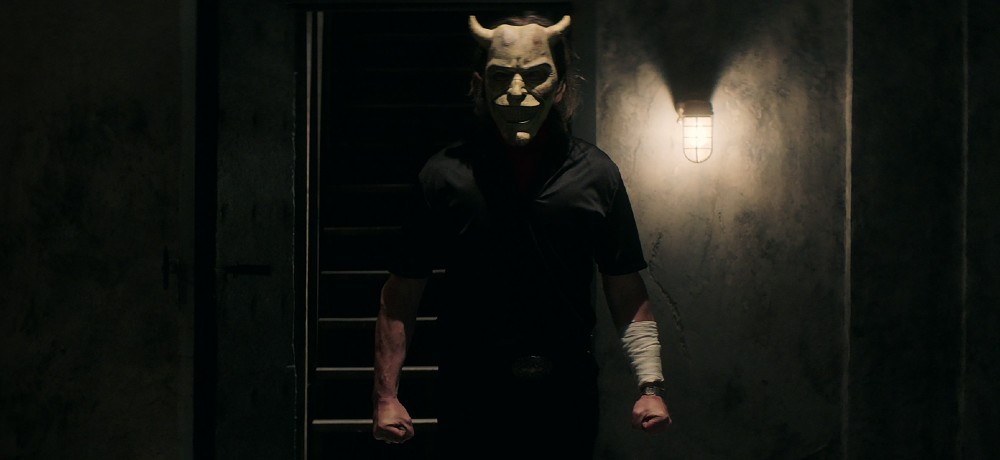


Adapted from the Joe Hill story of the same name, Scott Derrickson’s The Black Phone perfectly captures the harrowing nature of childhood, straddling the line between creating an emotionally driven narrative that packs a wallop coupled with a story brimming with tension and terror. Not that I wasn’t expecting anything less from the creative team behind Sinister (which still remains the last genre movie to truly scare me), but I really enjoyed how Derrickson has once again crafted a modern horror classic in the making that may have these touches of nostalgia, but still feels of this time all the same.
The Black Phone transports us back to the year 1978 and is centered around a young boy named Finney (Mason Thames), who spends his time avoiding conflict however he can, whether it’s dodging bullies at school or doing his best not to piss off his alcoholic dad (Jeremy Davies, who is terrifying at times here). Finney’s only real refuge from the horrors of real life is spending time with his smart aleck sister, Gwen (Madeleine McGraw), with whom he shares an unbreakable bond. Panic begins to spread in their small Colorado community when news of a kidnapper hits, as reports of a mysterious man known as “The Grabber” (played by Ethan Hawke) begin to torment both parents and children alike. One day, Finney happens to cross paths with The Grabber and subsequently finds himself locked in a soundproof basement, not knowing how he got there or just what his fate will be now that he’s been nabbed. Inexplicably, there happens to be a black rotary phone on the wall in the basement that seemingly does not work—or so The Grabber thinks. As it turns out, the phone ends up becoming a lifeline for Finney as the child abductor/killer’s previous victims begin calling him, offering him advice on how to survive his hellish ordeal and stay alive against all odds.
I think one of my favorite tropes in horror is when you have a device featured in your story that has no possible rational explanation that hints at something otherworldly, but yet, the framing of such a device feels wholly grounded all the same. And in The Black Phone, both Derrickson, as well as his fellow co-writer and frequent collaborator C. Robert Cargill, do an excellent job of taking something so impossible and making it feel wholly possible all the same. If not done right, it can completely take me out of a viewing experience, but how the titular device is utilized here totally worked for me and helped heighten the unwavering tensions that pulsate throughout the film.
And speaking of rattling some nerves, one of the reasons The Black Phone ends up being so damn good is just how oppressively suspenseful Derrickson’s latest genre effort is. Honestly, between Sinister and The Black Phone, I’m pretty much on board for any and all collaborations that he does with Cargill, because they prove that in this day and age where it can be hard to push horror fans’ buttons, they know precisely the right formula to really amp up the terror in ways that crawl under your skin.
As far as the performances go in The Black Phone, I guarantee that you’ll never look at Ethan Hawke the same way again after you see his performance here. Holy hell. In the Q&A following the film, Derrickson discussed how Hawke doesn’t really like taking on villainous roles, but I gotta say that he truly gives a wholly transformative, bloodcurdling, and captivating performance in The Black Phone that is truly unlike anything we’ve ever seen from him before. Also, I’d be remiss if I didn’t do a quick shout-out to Tom Savini, who designed the masks that Hawke’s character wears throughout the film, which adds so much to the character of The Grabber on a visual level. In terms of the child performances in The Black Phone, both Thames and McGraw are astonishingly great, confidently holding their own against actors who have decades on them. Thames’ performance as Finney provides The Black Phone with the emotional foundation needed to pull viewers in and keep us invested, and McGraw nearly steals every scene that she appears in. It’s also worth noting that James Ransone shows up in The Black Phone, too, who many will remember from Sinister, and his performance in this is properly unhinged.
While I can’t speak to just how faithful of an adaptation this is (I never had a chance to read Joe Hill’s original story before seeing Derrickson’s film), what I can say is that The Black Phone tackles the omnipresent nature of horror and how it can consume our lives even when it doesn’t directly affect us. For so many of us kids who grew up during this era, and lived through hearing the traumatic stories of John Wayne Gacy’s victims, or even young Adam Walsh, the son of America’s Most Wanted’s John Walsh, who was kidnapped from a mall in the early ’80s and became the subject of a made-for-TV movie, being taken away from our families and everything we know and love was truly one of the most terrifying prospects ever that hung over our childhood experiences. And The Black Phone really captures that paranoia and anxiety to a tee, making it a brutally effective horror show that also somehow manages to give us glimmers of hope as well.
Movie Score: 4/5
---------
Visit our online hub to catch up on all of our coverage of the 2021 Fantastic Fest!